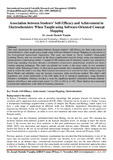| dc.contributor.author | Wangila, Joseph M. | |
| dc.date.accessioned | 2022-05-09T09:10:50Z | |
| dc.date.available | 2022-05-09T09:10:50Z | |
| dc.date.issued | 2021-11 | |
| dc.identifier.citation | International Journal of Scientific Research and Management (IJSRM) Volume 09 Issue11 Page EL-2021-1997-2009 2021 Website: www.ijsrm.in ISSN (e): 2321-3418 DOI: 10.18535/ijsrm/v9i11.el05 | en_US |
| dc.identifier.issn | 2321-3418 | |
| dc.identifier.uri | https://ijsrm.in/index.php/ijsrm/article/view/3483 | |
| dc.identifier.uri | https://www.sciencegate.app/document/10.18535/ijsrm/v9i11.el05 | |
| dc.identifier.uri | http://hdl.handle.net/123456789/5770 | |
| dc.description.abstract | This study determined the association between Kenyan students’ self-efficacy and their achievement in electrochemistry when taught using taught using Software-Oriented Concept Mapping in comparison to the Conventional Instructional Approaches. The study was based on David Ausubel’s Meaningful Learning Theory, and was executed via the Quasi-experimental research design, using non-randomized pretest-posttest control group model. A sample of 400 students and 10 chemistry teachers was selected by multi-stage sampling procedure, through a combination of purposive, proportionate stratified and simple random sampling techniques. The study was piloted two weeks to the actual study, in two secondary schools within Kakamega County. A close-ended questionnaire and a standardized achievement test were used to collect the study’s raw data. Both research instruments were assessed for their validaty using the Rasch Model, and reliability using the internal consistency alpha coefficients method. The study’s null hypothesis was tested inferentially at the 0.05 alpha level of statistical significance, using Bivariate Pearson’s Correlation. Findings revealed a weak but significant positive association between students’ posttest self-efficacy and achievement scores [r=.228, p<.001 at α=.05]. These findings have important instructional implications in the field of Chemistry education. | en_US |
| dc.language.iso | en | en_US |
| dc.publisher | International Journal of Scientific Research and Management | en_US |
| dc.subject | Self-Efficacy, Achievement, Concept-Mapping, Electrochemistry | en_US |
| dc.title | Association between Students’ Self-Efficacy and Achievement in Electrochemistry When Taught using Software-Oriented Concept Mapping | en_US |
| dc.type | Article | en_US |

